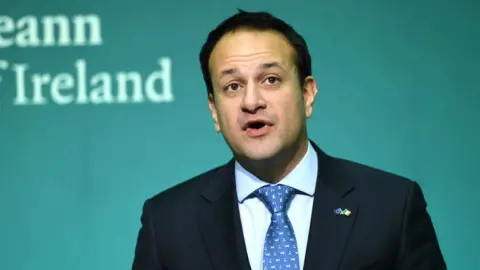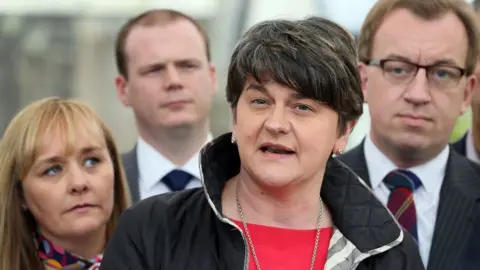Leo Varadkar will not support direct rule for NI
 Reuters
ReutersThe Irish government would expect to have a "real and meaningful involvement" in Northern Ireland if efforts to restore Stormont fail, the Irish prime minister has said.
Leo Varadkar said he would not support a return to direct rule from London if time is called on talks to restore a power-sharing government in Belfast.
He said that he would make a fresh bid for a deal in January.
Northern Ireland has been without a government for almost a year.
The Stormont executive collapsed at the start of 2017 after a bitter row between the DUP and Sinn Féin over a failed energy scheme.
Several rounds of talks, and a fresh Assembly election, have failed to restore the power-sharing government.
Northern Ireland Secretary James Brokenshire has said that while the UK government does not want a return to direct rule, time is running out to restore devolution.
Leo Varadkar insisted that there would be only two options if talks fail; either to call Another assembly election, or convene the British-Irish Intergovernmental Conference (BIGC).
The taoiseach (Irish prime minister) suggested he would seek the latter, adding that little would be gained from another snap election.
 AFP
AFPDUP leader Arlene Foster dismissed the group as a "talking shop".
The BIGC is a bilateral body constructed out of the 1998 Good Friday Agreement, which brought to an end the 30 years of sectarian conflict in Northern Ireland known as The Troubles.
It brings together UK and Irish ministers to encourage co-operation on matter of mutual interest in Northern Ireland, and last met in 2007.
Unionists have insisted that the UK government would be in sole charge of the region if there is direct rule and that there will be no joint authority between the UK and Irish governments over Northern Ireland.
Responding to Mr Varadkar's statement, the DUP said it would not be acceptable for the Irish government to be involved in Northern Ireland's internal affairs.
"It would be a fundamental breach of all the agreements we have reached," DUP MP Jeffrey Donaldson told the BBC's Good Morning Ulster programme.
"Matters internal to Northern Ireland are a matter for the UK government and NI parties alone."
'International agreement'
Mr Varadkar said he would not characterise the Republic's potential role as a form of "joint rule", acknowledging legislative authority rested with Westminster, but he said his government should have significant involvement.
"Essentially the Good Friday Agreement provides for matters that are not devolved to be dealt with by the British-Irish governmental conference and that's what we will seek," he said.
"We won't be supporting direct rule. We didn't support direct rule.
"So the alternative to the assembly and the executive being up and running is either a) an election, or b) convening the British-Irish governmental conference, and that's what we'll seek, and I should point out that is what the Good Friday Agreement says.
"So all we'd be seeking is the implementation of the Good Friday Agreement which, as you know, is an international agreement between two governments endorsed by referendum in both parts of the island."
Asked if he envisaged a form of joint rule, the taoiseach said: "I wouldn't use the term 'joint rule', because that's not the term used in the Good Friday Agreement.
"The Good Friday Agreement speaks of a British-Irish governmental conference which is not joint rule because obviously the legislative powers remain at Westminster, but it does involve real and meaningful involvement of the Irish government," he added.
Mr Varadkar said he and his deputy Simon Coveney hoped to meet Stormont's political leaders next month to discuss a return to power-sharing.
